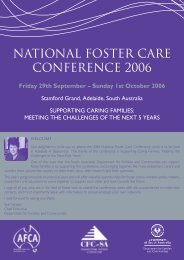Supporting Carers Of Other People's Children - Australian Foster ...
Supporting Carers Of Other People's Children - Australian Foster ...
Supporting Carers Of Other People's Children - Australian Foster ...
- No tags were found...
Create successful ePaper yourself
Turn your PDF publications into a flip-book with our unique Google optimized e-Paper software.
Elizabethzabeth, veteran carer of babies‘I don’t know when foster carers retire – whenyou’re too old to pick the baby up out of the cot, orget the pram out of the boot?’Elizabeth is 68, and this year she clocks up fortyyears of caring for babies. ‘It feels like I’ve nevernot done it! I started fostering when my own lastchild was nearly four.’Her enthusiasm for the role has not diminished.‘Newborns are my favourites. I love to get themstraight from hospital. I don’t know why. WhenI was young I was the kid in the street that hadeveryone playing in my front yard while I pushednext door’s baby in the pram. Before marrying Itrained as a nurse at the <strong>Children</strong>’s Hospital. Somepeople are just here for that reason – caring forchildren – and I’m one of those people. This iswhat I’m good at.’Elizabeth can also laugh at how this lifetime ofbaby care has affected her. ‘I can’t walk past ababy wear shop. My wardrobe of baby clothes isbigger than my own wardrobe! And I’m alwaysknitting for them.’‘One day I was standing alone in the line at thesupermarket with a cabbage under my arm. Iheard a baby crying in one of the aisles and startedrocking the cabbage.’‘Another day, before air conditioning in cars, I wason my own in my car with the windows down ona hot day, stopped at a railway crossing. As thetrain went past I said “Toot toot!”, because I wasso used to having a little one in the back seat. Thebloke in the car opposite went “Toot toot” back atme!’Elizabeth’s fostering career covers the full historyof care. She began through a major women’shospital in the 1960s, when adoption prevailed.The law in her state had changed, so that mothersof newborns considering adoption had 28 days tobe sure. ‘All these little babies were lying in wardsof the hospital, not progressing. A doctor noticedthat the newborns taken home by their mothers,and brought back at 6 weeks for a check-up, weremuch more advanced than the ones left at thehospital by Mums putting them up for adoption.They weren’t connecting with anybody. He said weneed mums who can take them home and bringthem back after 28 days.’This was called “pre-adopt” fostering, and Elizabethbecame one of 70 women in the state doing it.‘Several of us are still good friends, and we’re stillfostering.’She requests babies only, and one at a time.And she has embraced the current philosophyof fostering with the aim of re-integration withthe birth parents. ‘I have a little three month oldchappie with me at the moment, who’s been withme since he was five days old. His parents aren’table to care for him, but they are going through25the court system and it would be wonderful if theywere able to work it out, and he could be returnedto them.’‘The aim is for one part of the system to care forthe child while another part of the system workswith the parents to get them right. Unfortunately insome cases it doesn’t work, but it’s very importantfor a child to keep in touch with birth families.’She struggles with some aspects of the system.‘You get a “partial reimbursement” of a little over$100 a week. It’s $18 for a can of formula, andthen there’s nappies. Agencies are supposed tohelp with equipment but they often don’t have a lotof money either.’‘So you’ve always got your hand in your ownpocket – even for petrol, taking them to access.Especially for country and rural people. I live justoutside a city, and this little fellow has been seeinghis mum three times a week in the city. I’m doing60 kilometres a week.’She would not consider other people taking him onthese trips. ‘The less people the baby has to face,the better it is for the baby. If he has someonecome to the door he’s never seen, they pick himup and take him away, he sees his mum, and aworker who watches, then someone else bringshim home...’Elizabeth feels legal decisions are still made‘through the eyes of the parent, not the child. Myconcern is for how the baby manages, not how themother manages. It’s my duty to speak up for thischild, and be the voice for it.’She is, undoubtedly, an expert. ‘Everyone asks ifI mind getting up in the night. And no, I don’t! Idon’t even need lights on. I know it all so well. Youget everything set up before you go to bed. Youeven put the numbers on the microwave so whenyou come out in the night to heat the bottle, youjust turn it on.’‘I always use the same sort of perfume for eachbaby, because their sense of smell is strong. Whenthey leave, I make sure they have their bunnyrugs



